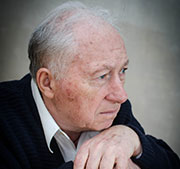
THURSDAY, May 7, 2015 (HealthDay News) — Statins, widely used to lower cholesterol levels, may also slow the progression of prostate cancer in patients receiving hormone therapy, a new study suggests.
Among 926 men undergoing hormone therapy for advanced prostate therapy, those taking statins saw significant benefits, researchers said. Their cancer remained stable for an average of 27.5 months before worsening, compared with an average of 17.4 months among men not taking statins.
“These findings are preliminary, so I would not recommend that everybody start on statins to slow prostate cancer,” said study senior author Dr. Philip Kantoff, chief of solid tumor oncology at the Dana-Farber Cancer Institute in Boston.
Also, Kantoff cautioned that these findings apply only to men who have advanced prostate cancer that has relapsed after hormone therapy.
“This does not speak to early stage prostate cancer or whether statins are beneficial in preventing prostate cancer,” he said.
Patients in the study, conducted from 1996 to 2013, were followed for nearly six years on average. The report was published May 7 online in JAMA Oncology.
Hormone therapy is the usual treatment for men who suffer from prostate cancer that has spread beyond the prostate gland. The therapy deprives the body of testosterone, the male hormone that helps cancer cells grow. However, over time, the therapy becomes less effective and the cancer begins to grow again.
Essentially, Kantoff explained, statins keep testosterone from entering cancer cells. They block dehydroepiandrosterone sulfate (DHEAS), a precursor of testosterone, thus preventing cancer cell growth, he said.
More specifically, lab experiments indicated that statins use up the available supply of a protein called SLCO2B1, which allows various drugs and hormones to enter cells. This appears to keep DHEAS from the cancer cells, making hormone therapy more effective.
“This is a plausible mechanism by which a statin may have a benefit to prostate cancer patients,” Kantoff said.
Kantoff added that more studies are needed to verify their findings. “We have a strong hypothesis, but it is by no means proof that statins prolong the time to relapse. But the data is strongly suggestive that that’s the fact,” he said.
Adding a statin to hormone therapy may be a way to make hormone therapy last longer and prevent cancer from progressing, Kantoff said.
Dr. Jorge Ramos, a hematology and oncology fellow at the University of Washington/Fred Hutchinson Cancer Research Center, discussed the study’s relevance.
“Other studies have suggested that statins might have a role in preventing cancer or reducing the risk of dying from cancer,” he said.
This study suggests how statins might act in slowing the progression of cancer, said Ramos, co-author of an editorial accompanying the study. “Statins by themselves probably won’t prevent cancer from growing, but in combinations with other treatments could improve outcomes for patients,” said .
However, Ramos agreed clinical trials are needed before people start taking statins to prevent or slow cancer.
Several trials are getting underway to test the benefits of statins in prostate cancer patients, Ramos said. But the results won’t be available for several years, he said.
For now, current data is insufficient to support taking statins to prevent prostate cancer or to live longer if you have it, Ramos said.
In the United States, it’s estimated that one in seven men will develop prostate cancer in his lifetime. About 220,800 new cases and 27,540 deaths from prostate cancer will be recorded this year, according to the American Cancer Society.
More information
For more about prostate cancer, visit the American Cancer Society.
Copyright © 2026 HealthDay. All rights reserved.

